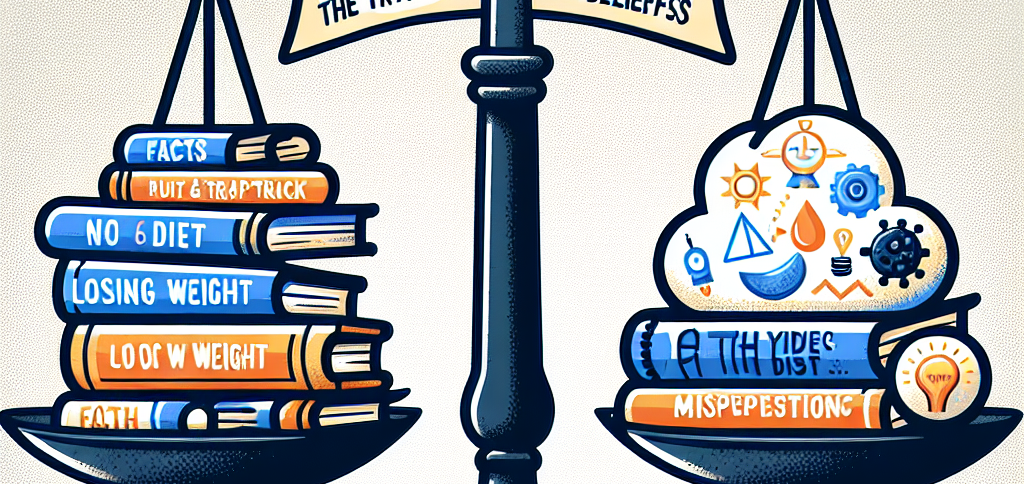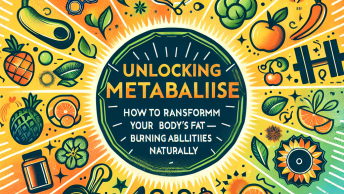In the age of health and wellness information, misconceptions about fat loss are rampant. These myths can lead to ineffective strategies and frustration. To help you navigate the sometimes muddy waters of fat loss, we’ve compiled a list of ten common myths and the facts that debunk them. Let’s dive in!
1. Myth: Carbs Make You Gain Weight
Fact: Carbohydrates are not inherently fattening. It’s the total number of calories consumed that matters for weight management. Carbs are an essential part of our diet and provide energy. The key is to choose whole, unprocessed carbs like fruits, vegetables, and whole grains rather than refined ones.
2. Myth: You Must Cut Out All Fats to Lose Weight
Fact: Dietary fats are essential for health, including hormone regulation and nutrient absorption. Healthy fats from sources like avocados, nuts, and olive oil can actually support your fat loss efforts. Moderation is the key instead of elimination.
3. Myth: Spot Reduction Works
Fact: The idea that you can reduce fat in specific areas of your body through targeted exercises (like doing crunches to lose belly fat) is largely a myth. Fat loss occurs throughout the body, influenced by genetics and overall activity levels. To promote fat loss, focus on a comprehensive fitness routine.
4. Myth: All Calories Are Created Equal
Fact: While it’s true that weight loss comes down to a calorie deficit, the source of those calories matters. Whole foods dense in nutrients are more satiating and beneficial for health than empty-calorie foods. For effective fat loss, prioritize nutrient-rich foods that fuel your body.
5. Myth: Cardio Is the Only Way to Lose Fat
Fact: While cardio is valuable for burning calories, it isn’t the only form of exercise that promotes fat loss. Resistance training is equally important, as it builds muscle mass, which can increase your resting metabolic rate. A balanced workout routine with both cardio and strength training is ideal for fat loss.
6. Myth: You Can Lose Weight Quickly and Keep It Off
Fact: Rapid weight loss might sound appealing, but it often leads to rebound weight gain. Sustainable fat loss is typically a gradual process. Aim for a slow and steady rate of weight loss—around 1-2 pounds per week. This approach allows your body to adapt and reduces the likelihood of regaining the weight.
7. Myth: Supplements Can Replace a Healthy Diet
Fact: No supplement can replace the nutrients obtained from a balanced diet. While some supplements can support fat loss efforts, they should not be viewed as magic pills. Whole foods should be your primary source of nutrition, and supplements should only be used to fill gaps if needed.
8. Myth: You Need to Exercise Every Day to Lose Fat
Fact: Rest and recovery are critical components of an effective fitness routine. While regular exercise is important for fat loss, your body also needs time to recover. Aim for a mix of active and rest days, and listen to your body to avoid burnout or injury.
9. Myth: Eating After a Certain Time Will Make You Gain Weight
Fact: The timing of your meals doesn’t directly contribute to weight gain. What matters most is the total amount of calories consumed throughout the day. If late-night eating contributes to an overall calorie surplus, then it could lead to weight gain, but it’s more about the quantity, not the timing.
10. Myth: Fat Loss Supplements Are Guaranteed to Work
Fact: The market is flooded with fat loss supplements, many of which make exaggerated claims. While some may support fat loss efforts, there are no guarantees. Always approach supplements with caution, and remember that there is no substitute for a balanced diet and regular exercise.
If you’re looking for scientifically backed methods to guide you on a successful fat loss journey, Click Here to learn more about resources that can help you achieve your goals effectively.
Final Thoughts
Understanding the difference between fat loss myths and facts is crucial for your journey to a healthier lifestyle. Avoiding these misconceptions can save you time, effort, and disappointment. Remember that the best approach to fat loss involves a combination of sustainable dietary habits, regular exercise, and patience. By equipping yourself with the right knowledge, you’ll be better prepared to make informed choices that align with your goals.
As you embark on your fat loss journey, it’s essential to remain educated and seek out credible sources of information. Consider consulting with professionals—like nutritionists or personal trainers—to receive personalized advice and support. Here’s to healthier living and empowered choices!






